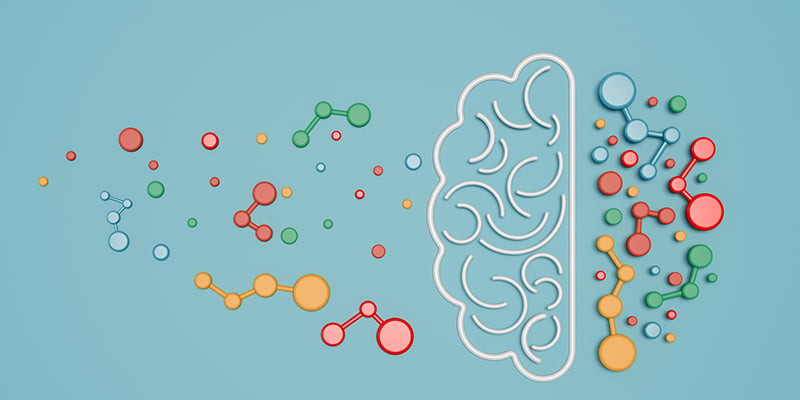
ADD. ADHD. People use these terms interchangeably to describe the attention-deficit condition that affects approximately 9.4% of children and 4.4% of adults, according to the CDC. But are ADD and ADHD the same thing? And if not, what are the differences between them?
Experts used to refer to attention-deficit disorder primarily as ADD but that has since changed, and ADHD (attention-deficit hyperactivity disorder) is now the preferred term. However, this is confusing because not everybody with the condition is hyperactive. Brain SPECT imaging at Amen Clinics has helped identify 7 types of ADD/ADHD, and surprisingly, there is only 1 type in which hyperactivity is always a symptom.
Brain SPECT imaging at Amen Clinics has helped identify 7 types of ADD/ADHD, and surprisingly, there is only 1 type in which hyperactivity is always a symptom. Click To TweetHYPERACTIVITY AND THE 7 TYPES OF ADD/ADHD
The 7 types of ADD/ADHD are:
- Classic
- Inattentive
- Overfocused
- Temporal Lobe
- Limbic
- Ring of Fire
- Anxious
There are a number of hallmark symptoms seen in all of the types, including short attention span, distractibility, disorganization, procrastination, and poor internal supervision. Hyperactivity, however, is not a hallmark symptom, meaning it is not present in each of the types.
In the classic type, hyperactivity is a common symptom that may take the shape of squirming, tapping feet or hands, talking incessantly, fidgeting, or being in constant motion. This restlessness occurs on a routine basis and can be disruptive in certain situations.
Such is not the case for the inattentive type, which doesn’t involve wriggling, twitching, or perpetual movement. People with this type are more likely to be daydreamers or to appear spacey or lazy. They may also be forgetful, seem bored, or be unmotivated.
In the remaining 5 types, hyperactivity may or may not be present. This means that in 6 of the 7 types, a person may have ADHD even though they do not display hyperactive tendencies.
WHY NON-HYPERACTIVE ADHD OFTEN GOES UNDIAGNOSED
Because hyperactivity is highly noticeable to other people, it is often what prompts an assessment for ADHD. On the contrary, people with non-hyperactive ADHD are more likely to fly under the radar. Symptoms such as being inattentive, being a daydreamer, or seeming bored aren’t as readily identifiable and aren’t always associated with the condition. For this reason, people who are missing the “H” in ADHD are more likely to remain undiagnosed. This is especially important for females, in whom inattentive ADHD is more common.
People who are missing the “H” in ADHD are more likely to remain undiagnosed. Click To TweetA lack of diagnosis means these individuals don’t receive the treatment they need to overcome their symptoms. Having any type of untreated ADHD is associated with an increased risk of depression, substance abuse, divorce, obesity, and other issues that further compound symptoms.
7 TREATMENTS FOR ALL TYPES OF ADHD
There are many treatments that are beneficial for all people with ADHD, including non-hyperactive ADHD.
- Take a 100% multIvitamin every day. Research shows that they help prevent chronic illness and help people with learning.
- Take omega-3 fatty acids in the form of high-quality fish oil. Recommended dosages are about 2,000 – 6,000mg for adults and 1,000 – 2,000mg for children. According to research, fish oil that is higher in the EPA form of omega-3s may be the most helpful, however, it depends on which type of ADHD a person has.
- Skip caffeine and ditch nicotine. These substances interfere with sleep, which may worsen symptoms.
- Aim for 30-45 minutes of daily exercise. Table tennis is the world’s best brain game, but any brain-safe activity will do.
- Set limits on digital device time. Strive for less than 30 minutes a day. This may be difficult, but it can be highly beneficial.
- Eat for the ADHD brain. Most people with ADHD do best with a higher-protein, lower-carbohydrate diet.
- Never give up seeking help and target treatments to your specific type of ADD/ADHD.
ADD/ADHD and other mental health issues can’t wait. At Amen Clinics, we’re here for you. We offer in-clinic brain scanning and appointments, as well as mental telehealth, clinical evaluations, and therapy for adults, teens, children, and couples. Find out more by speaking to a specialist today at 888-288-9834 or visit our contact page here.





Would like to schedule appointment for me and my husband if he will
Comment by Deana Marie Pickett — December 16, 2021 @ 12:42 PM
Hello Deana Marie Pickett, thank you for reaching out. We would be happy to contact you directly with more information about scheduling an appointment at one of our nine clinics across the US. We look forward to speaking with you soon.
Comment by Amen Clinics — December 16, 2021 @ 4:40 PM
My son has classic ADHD but he is now 24.
He is unable to manage his condition. He is severely depressed, has rage management problems and impulse issues.
Comment by Nicole Walsh — December 20, 2021 @ 3:45 AM
Do you have any clinics close to Texas?
Comment by Terri L Richards — December 20, 2021 @ 9:26 AM
Hello Terri. Yes. We opened up a clinic in the Dallas metro area in the beginning of 2021: https://amenclinics.com/locations/dallas-metro-area/. For more information about scheduling, please contact our Care Coordinators: https://amenclinics.com/schedule-visit/.
Comment by Amen Clinics — December 20, 2021 @ 11:26 AM
Hello Nicole, thank you for reaching out. We would be more than willing to contact you directly with more information about scheduling an appointment and getting your son the help he needs. We look forward to speaking with you soon.
Comment by Amen Clinics — December 20, 2021 @ 3:56 PM
If we don’t live in the same state as one of the clinics but want to be scanned/treated, do you allow that?
Comment by Krissy — December 20, 2021 @ 11:18 PM
Hello Krissy, thank you for reaching out. We are expanding more in 2022, so stay tuned for more locations coming! In the meantime, if you’re unable to visit one of our current 9 nationwide locations, our Care Coordinators may be able to recommend resources and referrals closer to you. Please contact us here: https://amenclinics.com/schedule-visit/.
Comment by Amen Clinics — December 22, 2021 @ 9:16 AM